MBA506: Thinking Styles, Negotiation & Conflict Management Report
VerifiedAdded on 2023/04/22
|13
|2617
|460
Report
AI Summary
This report reflects on a negotiation role-play undertaken for MBA506, focusing on the application of thinking styles, negotiation strategies, and conflict management techniques in a commercial property sale scenario. The negotiator represents Farnsworth Property Trust in selling a commercial property to Pashendale Holdings Limited. The report details the pre-negotiation phase, including the identification of thinking styles (monarchical and external scope), BATNA (Best Alternative to a Negotiated Agreement), and reservation values for both parties, as well as the ZOPA (Zone of Possible Agreement). The negotiation process is documented through a communications log, highlighting email exchanges and discussed items. The post-negotiation reflection assesses the effectiveness of the chosen strategies, acknowledging the negative outcome due to lack of response from the client, and the potential benefits of alternative thinking styles. The report also includes a self-assessment inventory on the monarchic style and references relevant academic literature.

Thinking Styles, Negotiation, and Conflict Management
Paraphrase This Document
Need a fresh take? Get an instant paraphrase of this document with our AI Paraphraser
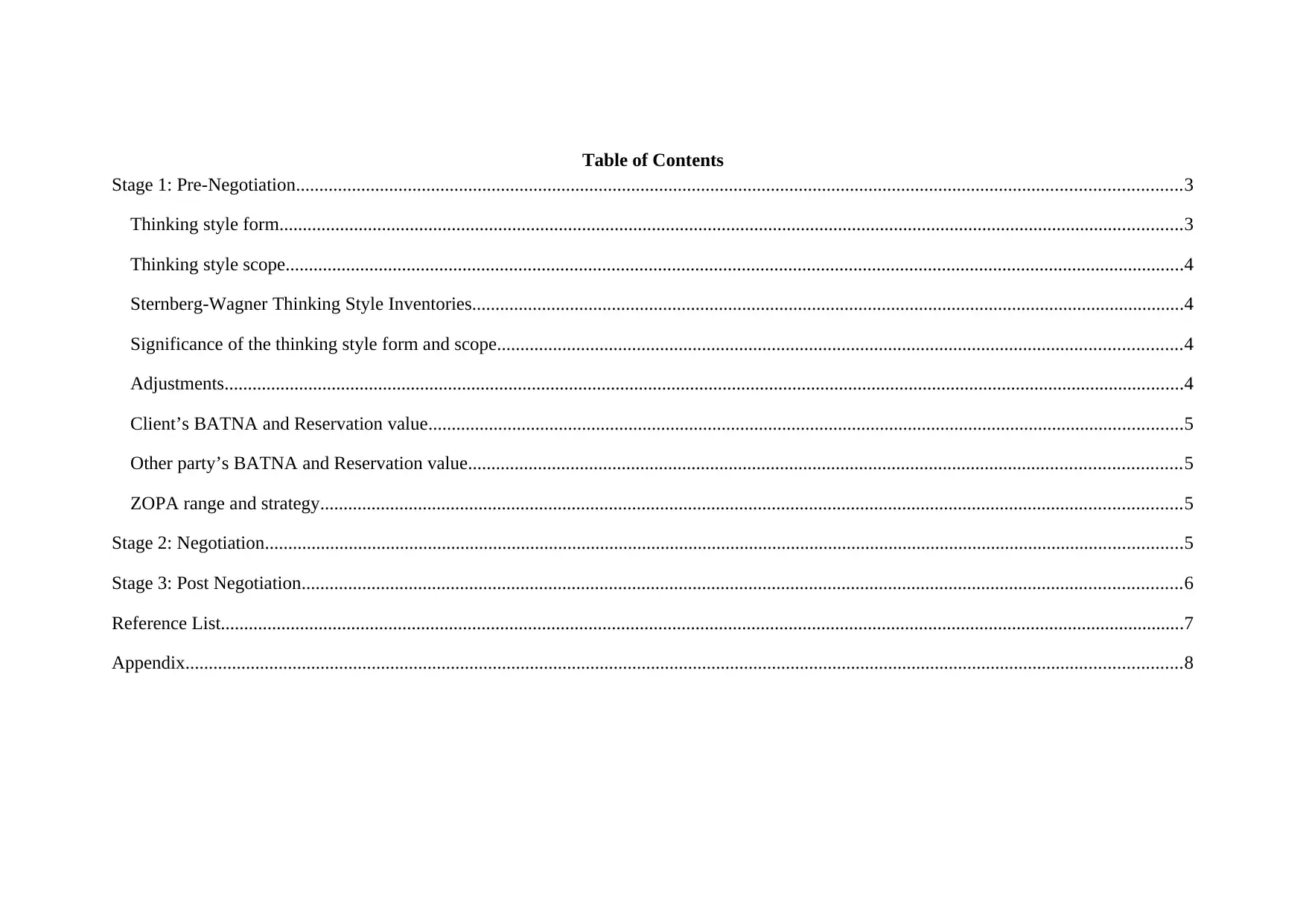
Table of Contents
Stage 1: Pre-Negotiation..............................................................................................................................................................................................3
Thinking style form..................................................................................................................................................................................................3
Thinking style scope.................................................................................................................................................................................................4
Sternberg-Wagner Thinking Style Inventories.........................................................................................................................................................4
Significance of the thinking style form and scope...................................................................................................................................................4
Adjustments..............................................................................................................................................................................................................4
Client’s BATNA and Reservation value..................................................................................................................................................................5
Other party’s BATNA and Reservation value.........................................................................................................................................................5
ZOPA range and strategy.........................................................................................................................................................................................5
Stage 2: Negotiation.....................................................................................................................................................................................................5
Stage 3: Post Negotiation.............................................................................................................................................................................................6
Reference List...............................................................................................................................................................................................................7
Appendix......................................................................................................................................................................................................................8
Stage 1: Pre-Negotiation..............................................................................................................................................................................................3
Thinking style form..................................................................................................................................................................................................3
Thinking style scope.................................................................................................................................................................................................4
Sternberg-Wagner Thinking Style Inventories.........................................................................................................................................................4
Significance of the thinking style form and scope...................................................................................................................................................4
Adjustments..............................................................................................................................................................................................................4
Client’s BATNA and Reservation value..................................................................................................................................................................5
Other party’s BATNA and Reservation value.........................................................................................................................................................5
ZOPA range and strategy.........................................................................................................................................................................................5
Stage 2: Negotiation.....................................................................................................................................................................................................5
Stage 3: Post Negotiation.............................................................................................................................................................................................6
Reference List...............................................................................................................................................................................................................7
Appendix......................................................................................................................................................................................................................8
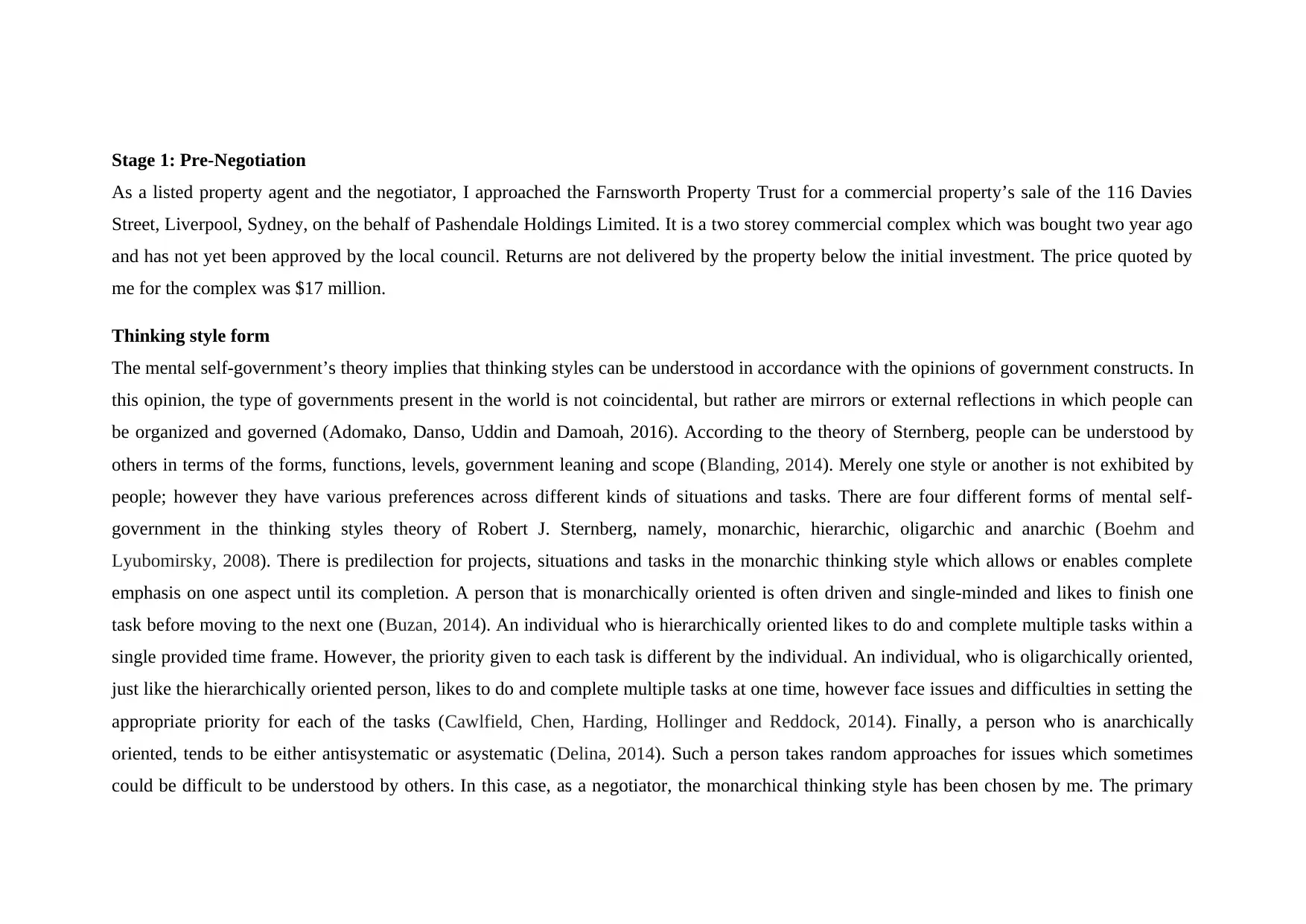
Stage 1: Pre-Negotiation
As a listed property agent and the negotiator, I approached the Farnsworth Property Trust for a commercial property’s sale of the 116 Davies
Street, Liverpool, Sydney, on the behalf of Pashendale Holdings Limited. It is a two storey commercial complex which was bought two year ago
and has not yet been approved by the local council. Returns are not delivered by the property below the initial investment. The price quoted by
me for the complex was $17 million.
Thinking style form
The mental self-government’s theory implies that thinking styles can be understood in accordance with the opinions of government constructs. In
this opinion, the type of governments present in the world is not coincidental, but rather are mirrors or external reflections in which people can
be organized and governed (Adomako, Danso, Uddin and Damoah, 2016). According to the theory of Sternberg, people can be understood by
others in terms of the forms, functions, levels, government leaning and scope (Blanding, 2014). Merely one style or another is not exhibited by
people; however they have various preferences across different kinds of situations and tasks. There are four different forms of mental self-
government in the thinking styles theory of Robert J. Sternberg, namely, monarchic, hierarchic, oligarchic and anarchic ( Boehm and
Lyubomirsky, 2008). There is predilection for projects, situations and tasks in the monarchic thinking style which allows or enables complete
emphasis on one aspect until its completion. A person that is monarchically oriented is often driven and single-minded and likes to finish one
task before moving to the next one (Buzan, 2014). An individual who is hierarchically oriented likes to do and complete multiple tasks within a
single provided time frame. However, the priority given to each task is different by the individual. An individual, who is oligarchically oriented,
just like the hierarchically oriented person, likes to do and complete multiple tasks at one time, however face issues and difficulties in setting the
appropriate priority for each of the tasks (Cawlfield, Chen, Harding, Hollinger and Reddock, 2014). Finally, a person who is anarchically
oriented, tends to be either antisystematic or asystematic (Delina, 2014). Such a person takes random approaches for issues which sometimes
could be difficult to be understood by others. In this case, as a negotiator, the monarchical thinking style has been chosen by me. The primary
As a listed property agent and the negotiator, I approached the Farnsworth Property Trust for a commercial property’s sale of the 116 Davies
Street, Liverpool, Sydney, on the behalf of Pashendale Holdings Limited. It is a two storey commercial complex which was bought two year ago
and has not yet been approved by the local council. Returns are not delivered by the property below the initial investment. The price quoted by
me for the complex was $17 million.
Thinking style form
The mental self-government’s theory implies that thinking styles can be understood in accordance with the opinions of government constructs. In
this opinion, the type of governments present in the world is not coincidental, but rather are mirrors or external reflections in which people can
be organized and governed (Adomako, Danso, Uddin and Damoah, 2016). According to the theory of Sternberg, people can be understood by
others in terms of the forms, functions, levels, government leaning and scope (Blanding, 2014). Merely one style or another is not exhibited by
people; however they have various preferences across different kinds of situations and tasks. There are four different forms of mental self-
government in the thinking styles theory of Robert J. Sternberg, namely, monarchic, hierarchic, oligarchic and anarchic ( Boehm and
Lyubomirsky, 2008). There is predilection for projects, situations and tasks in the monarchic thinking style which allows or enables complete
emphasis on one aspect until its completion. A person that is monarchically oriented is often driven and single-minded and likes to finish one
task before moving to the next one (Buzan, 2014). An individual who is hierarchically oriented likes to do and complete multiple tasks within a
single provided time frame. However, the priority given to each task is different by the individual. An individual, who is oligarchically oriented,
just like the hierarchically oriented person, likes to do and complete multiple tasks at one time, however face issues and difficulties in setting the
appropriate priority for each of the tasks (Cawlfield, Chen, Harding, Hollinger and Reddock, 2014). Finally, a person who is anarchically
oriented, tends to be either antisystematic or asystematic (Delina, 2014). Such a person takes random approaches for issues which sometimes
could be difficult to be understood by others. In this case, as a negotiator, the monarchical thinking style has been chosen by me. The primary
⊘ This is a preview!⊘
Do you want full access?
Subscribe today to unlock all pages.

Trusted by 1+ million students worldwide
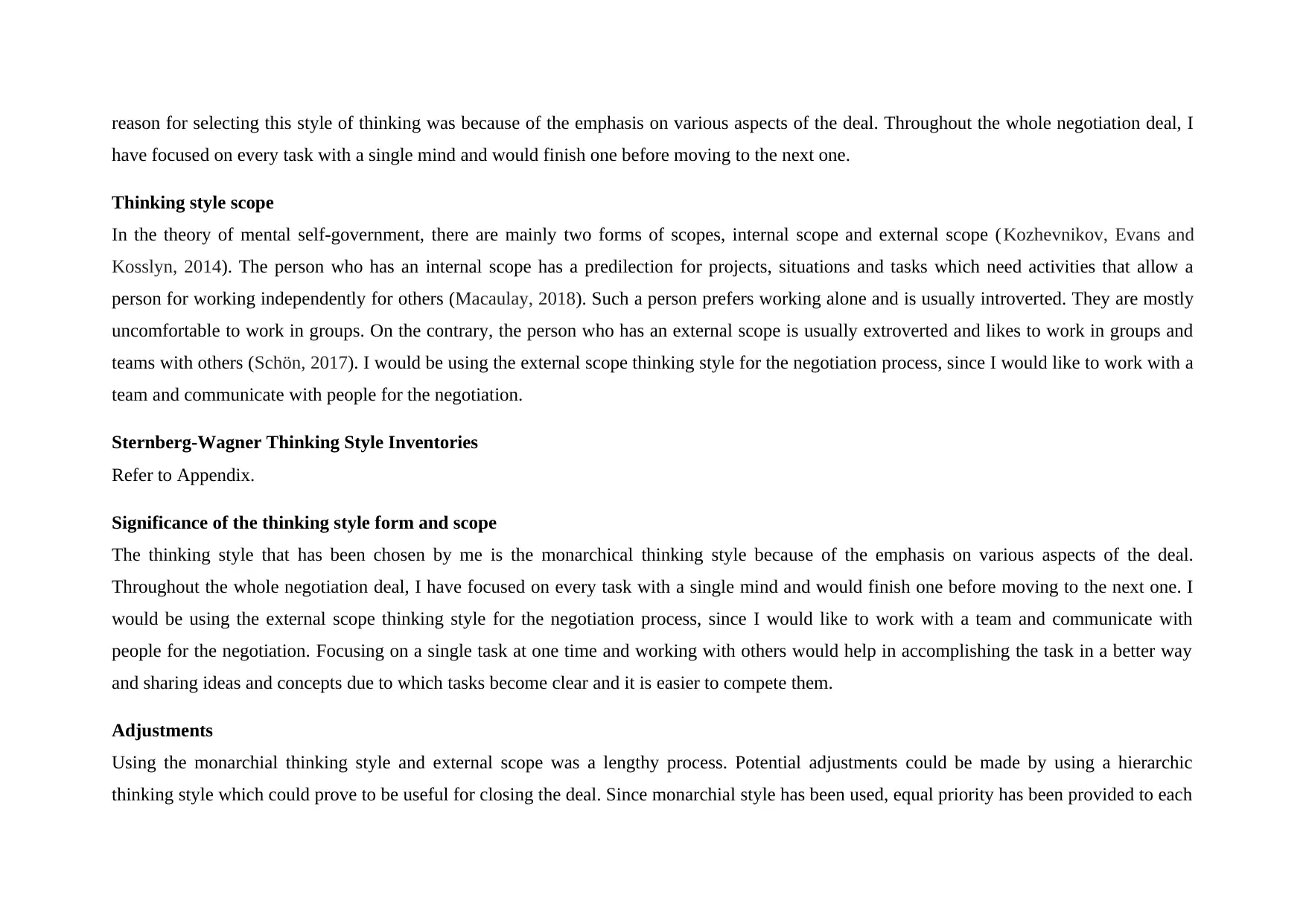
reason for selecting this style of thinking was because of the emphasis on various aspects of the deal. Throughout the whole negotiation deal, I
have focused on every task with a single mind and would finish one before moving to the next one.
Thinking style scope
In the theory of mental self-government, there are mainly two forms of scopes, internal scope and external scope ( Kozhevnikov, Evans and
Kosslyn, 2014). The person who has an internal scope has a predilection for projects, situations and tasks which need activities that allow a
person for working independently for others (Macaulay, 2018). Such a person prefers working alone and is usually introverted. They are mostly
uncomfortable to work in groups. On the contrary, the person who has an external scope is usually extroverted and likes to work in groups and
teams with others (Schön, 2017). I would be using the external scope thinking style for the negotiation process, since I would like to work with a
team and communicate with people for the negotiation.
Sternberg-Wagner Thinking Style Inventories
Refer to Appendix.
Significance of the thinking style form and scope
The thinking style that has been chosen by me is the monarchical thinking style because of the emphasis on various aspects of the deal.
Throughout the whole negotiation deal, I have focused on every task with a single mind and would finish one before moving to the next one. I
would be using the external scope thinking style for the negotiation process, since I would like to work with a team and communicate with
people for the negotiation. Focusing on a single task at one time and working with others would help in accomplishing the task in a better way
and sharing ideas and concepts due to which tasks become clear and it is easier to compete them.
Adjustments
Using the monarchial thinking style and external scope was a lengthy process. Potential adjustments could be made by using a hierarchic
thinking style which could prove to be useful for closing the deal. Since monarchial style has been used, equal priority has been provided to each
have focused on every task with a single mind and would finish one before moving to the next one.
Thinking style scope
In the theory of mental self-government, there are mainly two forms of scopes, internal scope and external scope ( Kozhevnikov, Evans and
Kosslyn, 2014). The person who has an internal scope has a predilection for projects, situations and tasks which need activities that allow a
person for working independently for others (Macaulay, 2018). Such a person prefers working alone and is usually introverted. They are mostly
uncomfortable to work in groups. On the contrary, the person who has an external scope is usually extroverted and likes to work in groups and
teams with others (Schön, 2017). I would be using the external scope thinking style for the negotiation process, since I would like to work with a
team and communicate with people for the negotiation.
Sternberg-Wagner Thinking Style Inventories
Refer to Appendix.
Significance of the thinking style form and scope
The thinking style that has been chosen by me is the monarchical thinking style because of the emphasis on various aspects of the deal.
Throughout the whole negotiation deal, I have focused on every task with a single mind and would finish one before moving to the next one. I
would be using the external scope thinking style for the negotiation process, since I would like to work with a team and communicate with
people for the negotiation. Focusing on a single task at one time and working with others would help in accomplishing the task in a better way
and sharing ideas and concepts due to which tasks become clear and it is easier to compete them.
Adjustments
Using the monarchial thinking style and external scope was a lengthy process. Potential adjustments could be made by using a hierarchic
thinking style which could prove to be useful for closing the deal. Since monarchial style has been used, equal priority has been provided to each
Paraphrase This Document
Need a fresh take? Get an instant paraphrase of this document with our AI Paraphraser
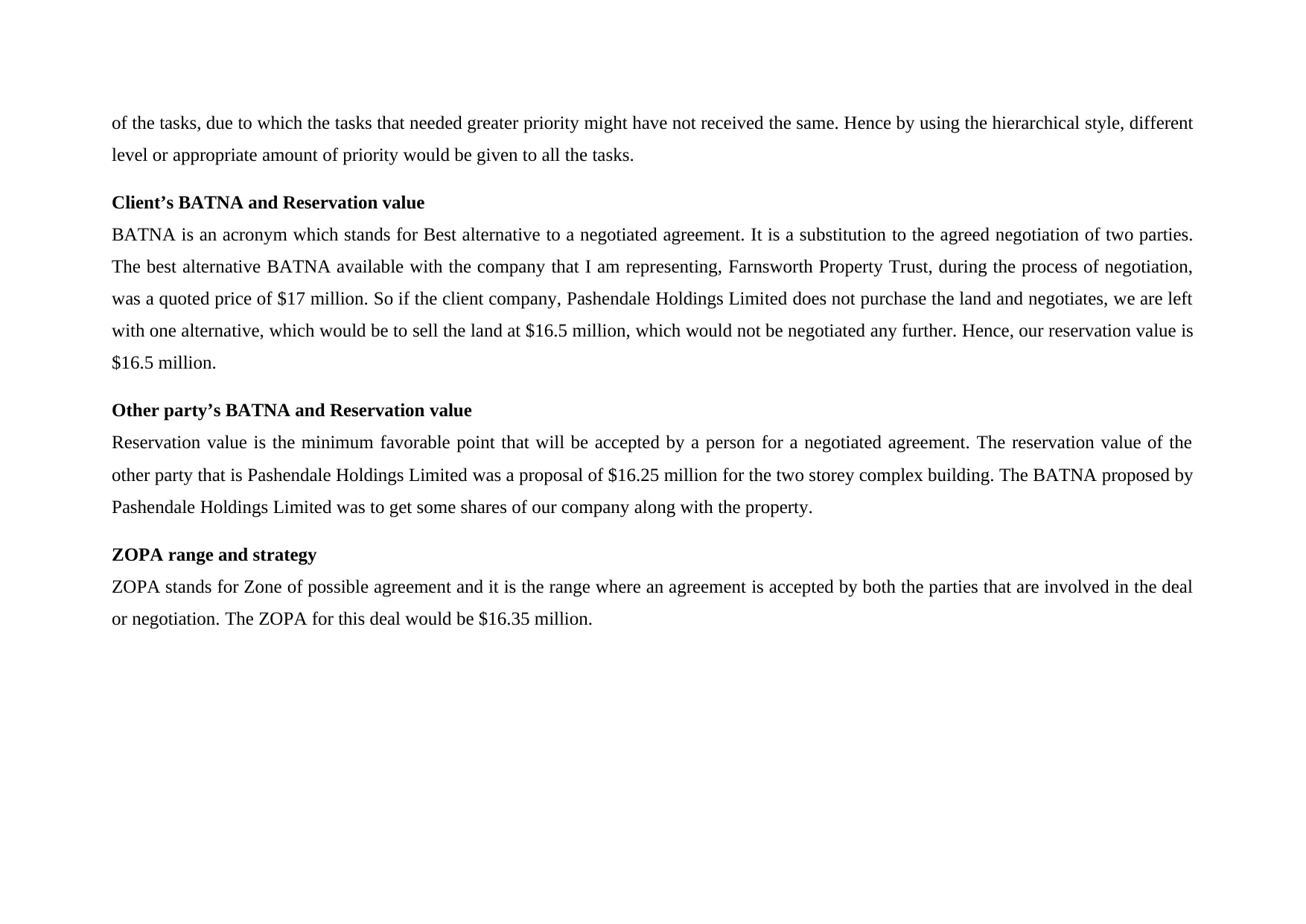
of the tasks, due to which the tasks that needed greater priority might have not received the same. Hence by using the hierarchical style, different
level or appropriate amount of priority would be given to all the tasks.
Client’s BATNA and Reservation value
BATNA is an acronym which stands for Best alternative to a negotiated agreement. It is a substitution to the agreed negotiation of two parties.
The best alternative BATNA available with the company that I am representing, Farnsworth Property Trust, during the process of negotiation,
was a quoted price of $17 million. So if the client company, Pashendale Holdings Limited does not purchase the land and negotiates, we are left
with one alternative, which would be to sell the land at $16.5 million, which would not be negotiated any further. Hence, our reservation value is
$16.5 million.
Other party’s BATNA and Reservation value
Reservation value is the minimum favorable point that will be accepted by a person for a negotiated agreement. The reservation value of the
other party that is Pashendale Holdings Limited was a proposal of $16.25 million for the two storey complex building. The BATNA proposed by
Pashendale Holdings Limited was to get some shares of our company along with the property.
ZOPA range and strategy
ZOPA stands for Zone of possible agreement and it is the range where an agreement is accepted by both the parties that are involved in the deal
or negotiation. The ZOPA for this deal would be $16.35 million.
level or appropriate amount of priority would be given to all the tasks.
Client’s BATNA and Reservation value
BATNA is an acronym which stands for Best alternative to a negotiated agreement. It is a substitution to the agreed negotiation of two parties.
The best alternative BATNA available with the company that I am representing, Farnsworth Property Trust, during the process of negotiation,
was a quoted price of $17 million. So if the client company, Pashendale Holdings Limited does not purchase the land and negotiates, we are left
with one alternative, which would be to sell the land at $16.5 million, which would not be negotiated any further. Hence, our reservation value is
$16.5 million.
Other party’s BATNA and Reservation value
Reservation value is the minimum favorable point that will be accepted by a person for a negotiated agreement. The reservation value of the
other party that is Pashendale Holdings Limited was a proposal of $16.25 million for the two storey complex building. The BATNA proposed by
Pashendale Holdings Limited was to get some shares of our company along with the property.
ZOPA range and strategy
ZOPA stands for Zone of possible agreement and it is the range where an agreement is accepted by both the parties that are involved in the deal
or negotiation. The ZOPA for this deal would be $16.35 million.
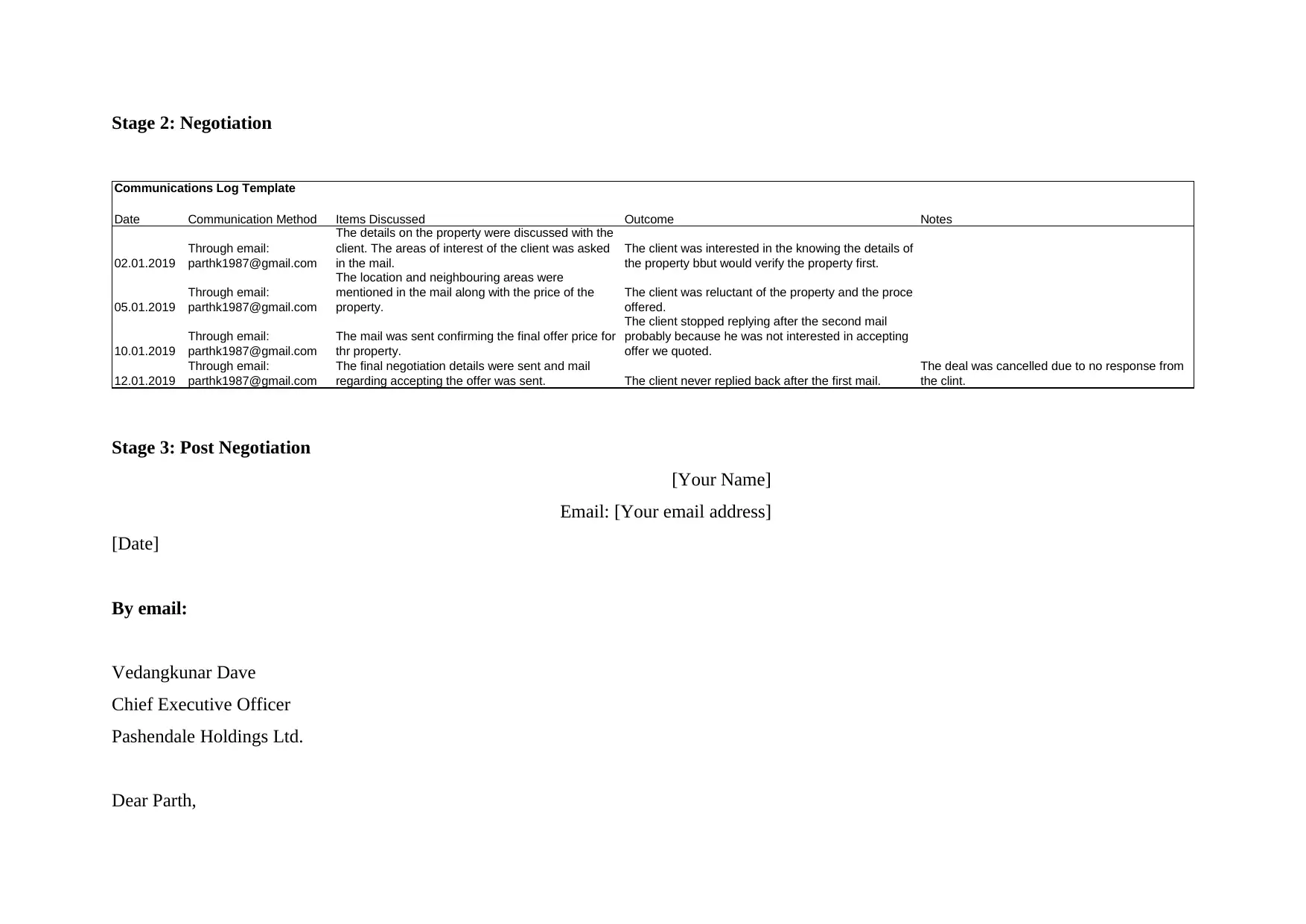
Stage 2: Negotiation
Communications Log Template
Date Communication Method Items Discussed Outcome Notes
02.01.2019
Through email:
parthk1987@gmail.com
The details on the property were discussed with the
client. The areas of interest of the client was asked
in the mail.
The client was interested in the knowing the details of
the property bbut would verify the property first.
05.01.2019
Through email:
parthk1987@gmail.com
The location and neighbouring areas were
mentioned in the mail along with the price of the
property.
The client was reluctant of the property and the proce
offered.
10.01.2019
Through email:
parthk1987@gmail.com
The mail was sent confirming the final offer price for
thr property.
The client stopped replying after the second mail
probably because he was not interested in accepting
offer we quoted.
12.01.2019
Through email:
parthk1987@gmail.com
The final negotiation details were sent and mail
regarding accepting the offer was sent. The client never replied back after the first mail.
The deal was cancelled due to no response from
the clint.
Stage 3: Post Negotiation
[Your Name]
Email: [Your email address]
[Date]
By email:
Vedangkunar Dave
Chief Executive Officer
Pashendale Holdings Ltd.
Dear Parth,
Communications Log Template
Date Communication Method Items Discussed Outcome Notes
02.01.2019
Through email:
parthk1987@gmail.com
The details on the property were discussed with the
client. The areas of interest of the client was asked
in the mail.
The client was interested in the knowing the details of
the property bbut would verify the property first.
05.01.2019
Through email:
parthk1987@gmail.com
The location and neighbouring areas were
mentioned in the mail along with the price of the
property.
The client was reluctant of the property and the proce
offered.
10.01.2019
Through email:
parthk1987@gmail.com
The mail was sent confirming the final offer price for
thr property.
The client stopped replying after the second mail
probably because he was not interested in accepting
offer we quoted.
12.01.2019
Through email:
parthk1987@gmail.com
The final negotiation details were sent and mail
regarding accepting the offer was sent. The client never replied back after the first mail.
The deal was cancelled due to no response from
the clint.
Stage 3: Post Negotiation
[Your Name]
Email: [Your email address]
[Date]
By email:
Vedangkunar Dave
Chief Executive Officer
Pashendale Holdings Ltd.
Dear Parth,
⊘ This is a preview!⊘
Do you want full access?
Subscribe today to unlock all pages.

Trusted by 1+ million students worldwide
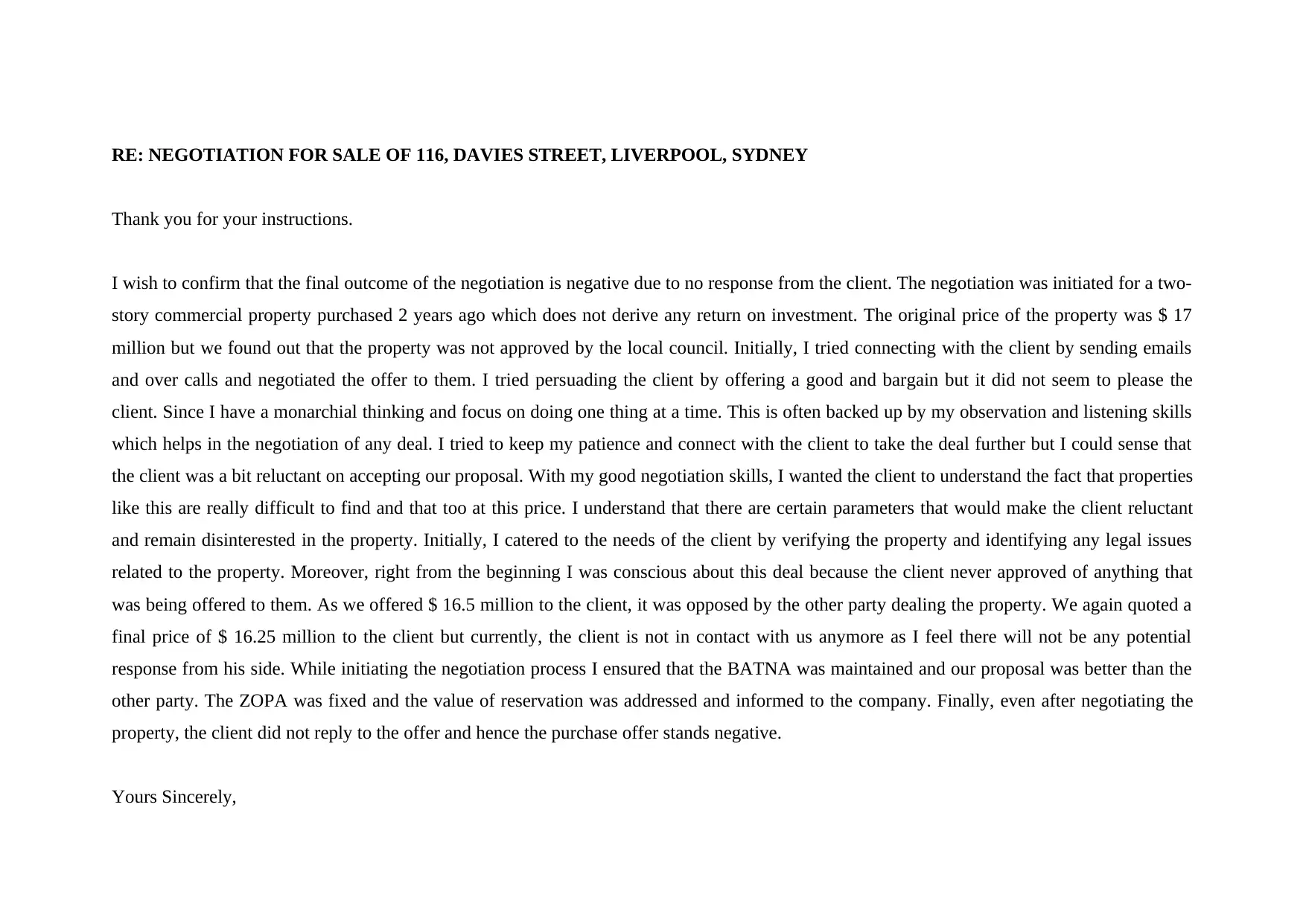
RE: NEGOTIATION FOR SALE OF 116, DAVIES STREET, LIVERPOOL, SYDNEY
Thank you for your instructions.
I wish to confirm that the final outcome of the negotiation is negative due to no response from the client. The negotiation was initiated for a two-
story commercial property purchased 2 years ago which does not derive any return on investment. The original price of the property was $ 17
million but we found out that the property was not approved by the local council. Initially, I tried connecting with the client by sending emails
and over calls and negotiated the offer to them. I tried persuading the client by offering a good and bargain but it did not seem to please the
client. Since I have a monarchial thinking and focus on doing one thing at a time. This is often backed up by my observation and listening skills
which helps in the negotiation of any deal. I tried to keep my patience and connect with the client to take the deal further but I could sense that
the client was a bit reluctant on accepting our proposal. With my good negotiation skills, I wanted the client to understand the fact that properties
like this are really difficult to find and that too at this price. I understand that there are certain parameters that would make the client reluctant
and remain disinterested in the property. Initially, I catered to the needs of the client by verifying the property and identifying any legal issues
related to the property. Moreover, right from the beginning I was conscious about this deal because the client never approved of anything that
was being offered to them. As we offered $ 16.5 million to the client, it was opposed by the other party dealing the property. We again quoted a
final price of $ 16.25 million to the client but currently, the client is not in contact with us anymore as I feel there will not be any potential
response from his side. While initiating the negotiation process I ensured that the BATNA was maintained and our proposal was better than the
other party. The ZOPA was fixed and the value of reservation was addressed and informed to the company. Finally, even after negotiating the
property, the client did not reply to the offer and hence the purchase offer stands negative.
Yours Sincerely,
Thank you for your instructions.
I wish to confirm that the final outcome of the negotiation is negative due to no response from the client. The negotiation was initiated for a two-
story commercial property purchased 2 years ago which does not derive any return on investment. The original price of the property was $ 17
million but we found out that the property was not approved by the local council. Initially, I tried connecting with the client by sending emails
and over calls and negotiated the offer to them. I tried persuading the client by offering a good and bargain but it did not seem to please the
client. Since I have a monarchial thinking and focus on doing one thing at a time. This is often backed up by my observation and listening skills
which helps in the negotiation of any deal. I tried to keep my patience and connect with the client to take the deal further but I could sense that
the client was a bit reluctant on accepting our proposal. With my good negotiation skills, I wanted the client to understand the fact that properties
like this are really difficult to find and that too at this price. I understand that there are certain parameters that would make the client reluctant
and remain disinterested in the property. Initially, I catered to the needs of the client by verifying the property and identifying any legal issues
related to the property. Moreover, right from the beginning I was conscious about this deal because the client never approved of anything that
was being offered to them. As we offered $ 16.5 million to the client, it was opposed by the other party dealing the property. We again quoted a
final price of $ 16.25 million to the client but currently, the client is not in contact with us anymore as I feel there will not be any potential
response from his side. While initiating the negotiation process I ensured that the BATNA was maintained and our proposal was better than the
other party. The ZOPA was fixed and the value of reservation was addressed and informed to the company. Finally, even after negotiating the
property, the client did not reply to the offer and hence the purchase offer stands negative.
Yours Sincerely,
Paraphrase This Document
Need a fresh take? Get an instant paraphrase of this document with our AI Paraphraser

Vedangkunar Dave
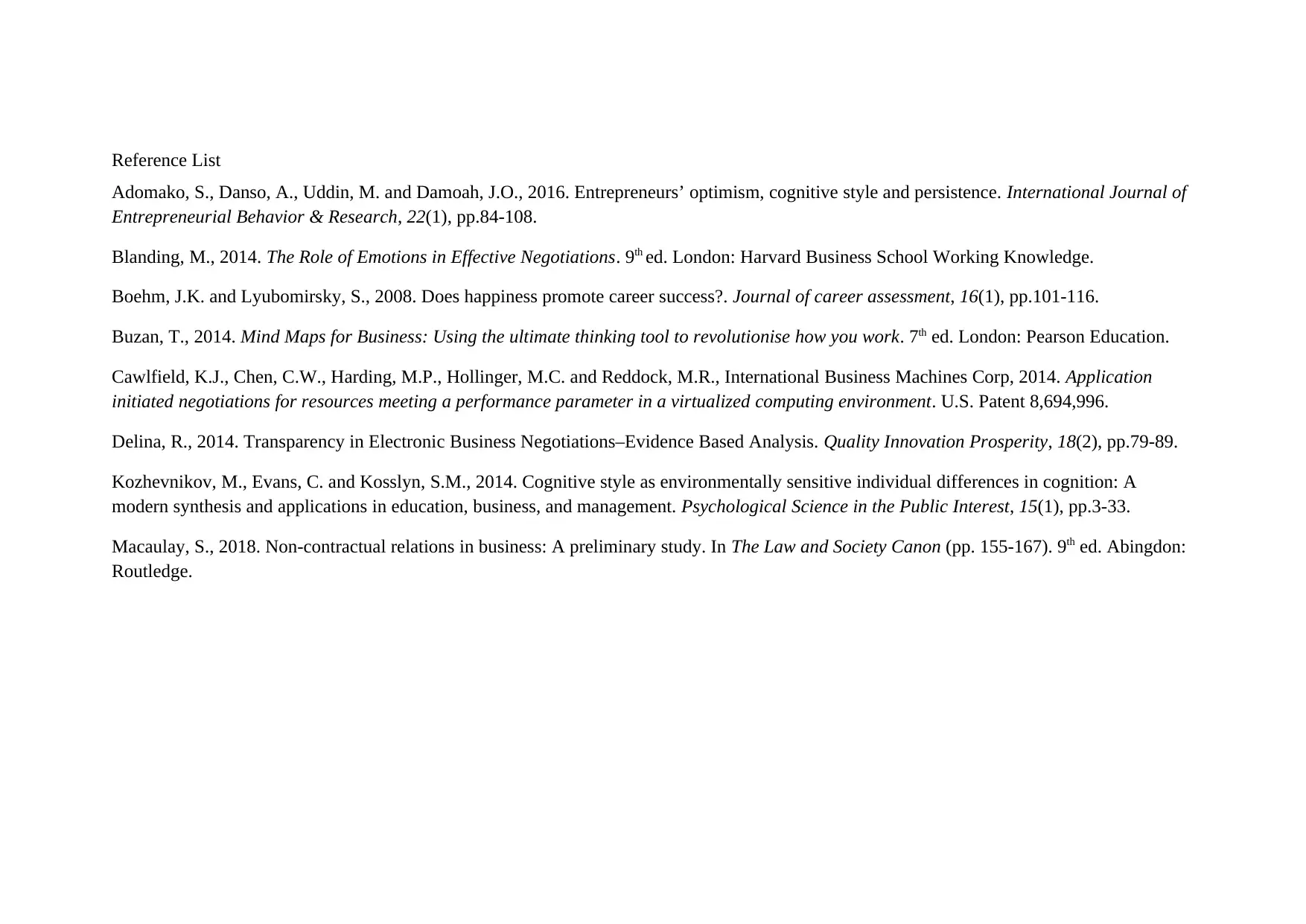
Reference List
Adomako, S., Danso, A., Uddin, M. and Damoah, J.O., 2016. Entrepreneurs’ optimism, cognitive style and persistence. International Journal of
Entrepreneurial Behavior & Research, 22(1), pp.84-108.
Blanding, M., 2014. The Role of Emotions in Effective Negotiations. 9th ed. London: Harvard Business School Working Knowledge.
Boehm, J.K. and Lyubomirsky, S., 2008. Does happiness promote career success?. Journal of career assessment, 16(1), pp.101-116.
Buzan, T., 2014. Mind Maps for Business: Using the ultimate thinking tool to revolutionise how you work. 7th ed. London: Pearson Education.
Cawlfield, K.J., Chen, C.W., Harding, M.P., Hollinger, M.C. and Reddock, M.R., International Business Machines Corp, 2014. Application
initiated negotiations for resources meeting a performance parameter in a virtualized computing environment. U.S. Patent 8,694,996.
Delina, R., 2014. Transparency in Electronic Business Negotiations–Evidence Based Analysis. Quality Innovation Prosperity, 18(2), pp.79-89.
Kozhevnikov, M., Evans, C. and Kosslyn, S.M., 2014. Cognitive style as environmentally sensitive individual differences in cognition: A
modern synthesis and applications in education, business, and management. Psychological Science in the Public Interest, 15(1), pp.3-33.
Macaulay, S., 2018. Non-contractual relations in business: A preliminary study. In The Law and Society Canon (pp. 155-167). 9th ed. Abingdon:
Routledge.
Adomako, S., Danso, A., Uddin, M. and Damoah, J.O., 2016. Entrepreneurs’ optimism, cognitive style and persistence. International Journal of
Entrepreneurial Behavior & Research, 22(1), pp.84-108.
Blanding, M., 2014. The Role of Emotions in Effective Negotiations. 9th ed. London: Harvard Business School Working Knowledge.
Boehm, J.K. and Lyubomirsky, S., 2008. Does happiness promote career success?. Journal of career assessment, 16(1), pp.101-116.
Buzan, T., 2014. Mind Maps for Business: Using the ultimate thinking tool to revolutionise how you work. 7th ed. London: Pearson Education.
Cawlfield, K.J., Chen, C.W., Harding, M.P., Hollinger, M.C. and Reddock, M.R., International Business Machines Corp, 2014. Application
initiated negotiations for resources meeting a performance parameter in a virtualized computing environment. U.S. Patent 8,694,996.
Delina, R., 2014. Transparency in Electronic Business Negotiations–Evidence Based Analysis. Quality Innovation Prosperity, 18(2), pp.79-89.
Kozhevnikov, M., Evans, C. and Kosslyn, S.M., 2014. Cognitive style as environmentally sensitive individual differences in cognition: A
modern synthesis and applications in education, business, and management. Psychological Science in the Public Interest, 15(1), pp.3-33.
Macaulay, S., 2018. Non-contractual relations in business: A preliminary study. In The Law and Society Canon (pp. 155-167). 9th ed. Abingdon:
Routledge.
⊘ This is a preview!⊘
Do you want full access?
Subscribe today to unlock all pages.

Trusted by 1+ million students worldwide
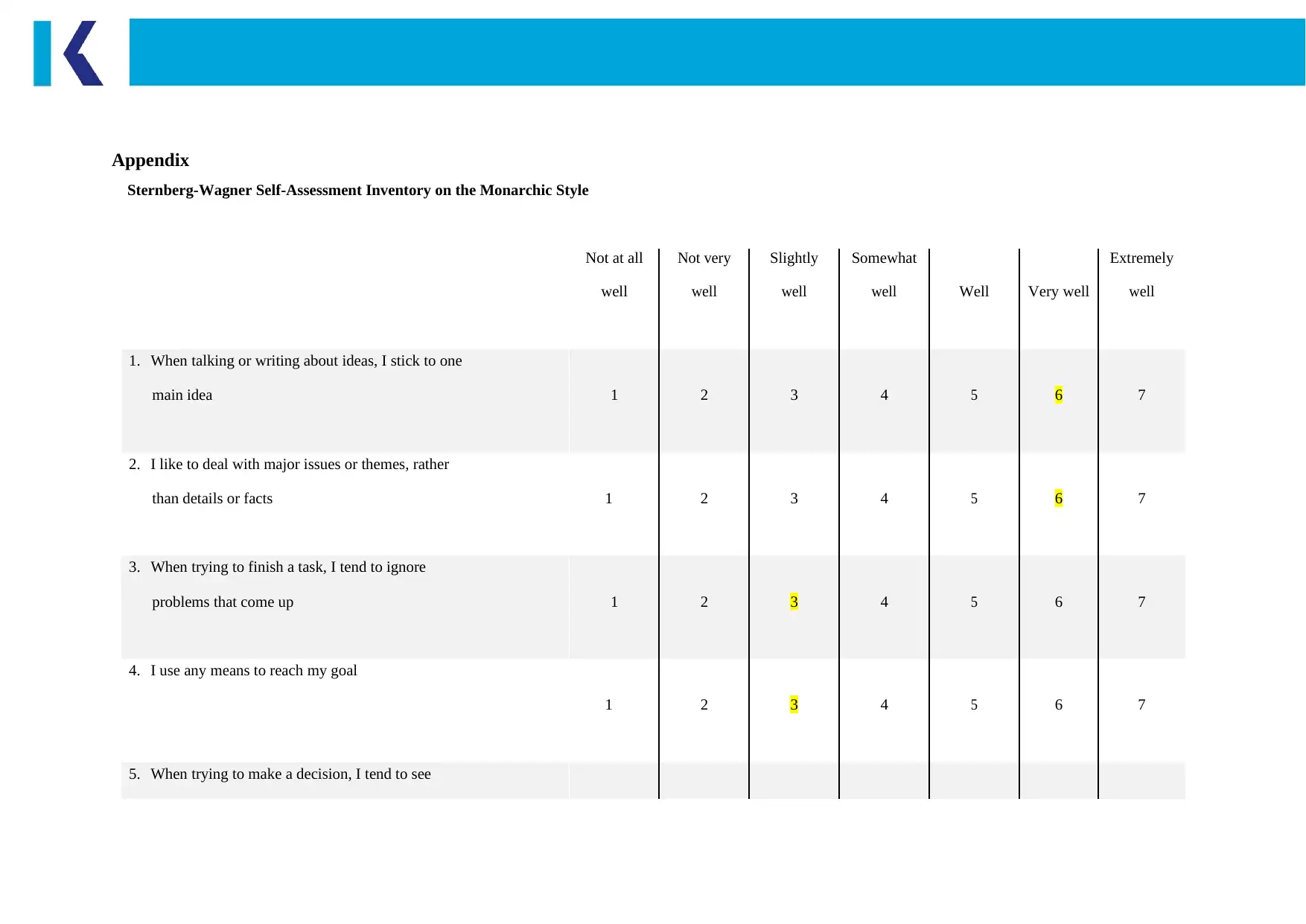
Appendix
Sternberg-Wagner Self-Assessment Inventory on the Monarchic Style
Not at all Not very Slightly Somewhat Extremely
well well well well Well Very well well
1. When talking or writing about ideas, I stick to one
main idea 1 2 3 4 5 6 7
2. I like to deal with major issues or themes, rather
than details or facts 1 2 3 4 5 6 7
3. When trying to finish a task, I tend to ignore
problems that come up 1 2 3 4 5 6 7
4. I use any means to reach my goal
1 2 3 4 5 6 7
5. When trying to make a decision, I tend to see
Sternberg-Wagner Self-Assessment Inventory on the Monarchic Style
Not at all Not very Slightly Somewhat Extremely
well well well well Well Very well well
1. When talking or writing about ideas, I stick to one
main idea 1 2 3 4 5 6 7
2. I like to deal with major issues or themes, rather
than details or facts 1 2 3 4 5 6 7
3. When trying to finish a task, I tend to ignore
problems that come up 1 2 3 4 5 6 7
4. I use any means to reach my goal
1 2 3 4 5 6 7
5. When trying to make a decision, I tend to see
Paraphrase This Document
Need a fresh take? Get an instant paraphrase of this document with our AI Paraphraser
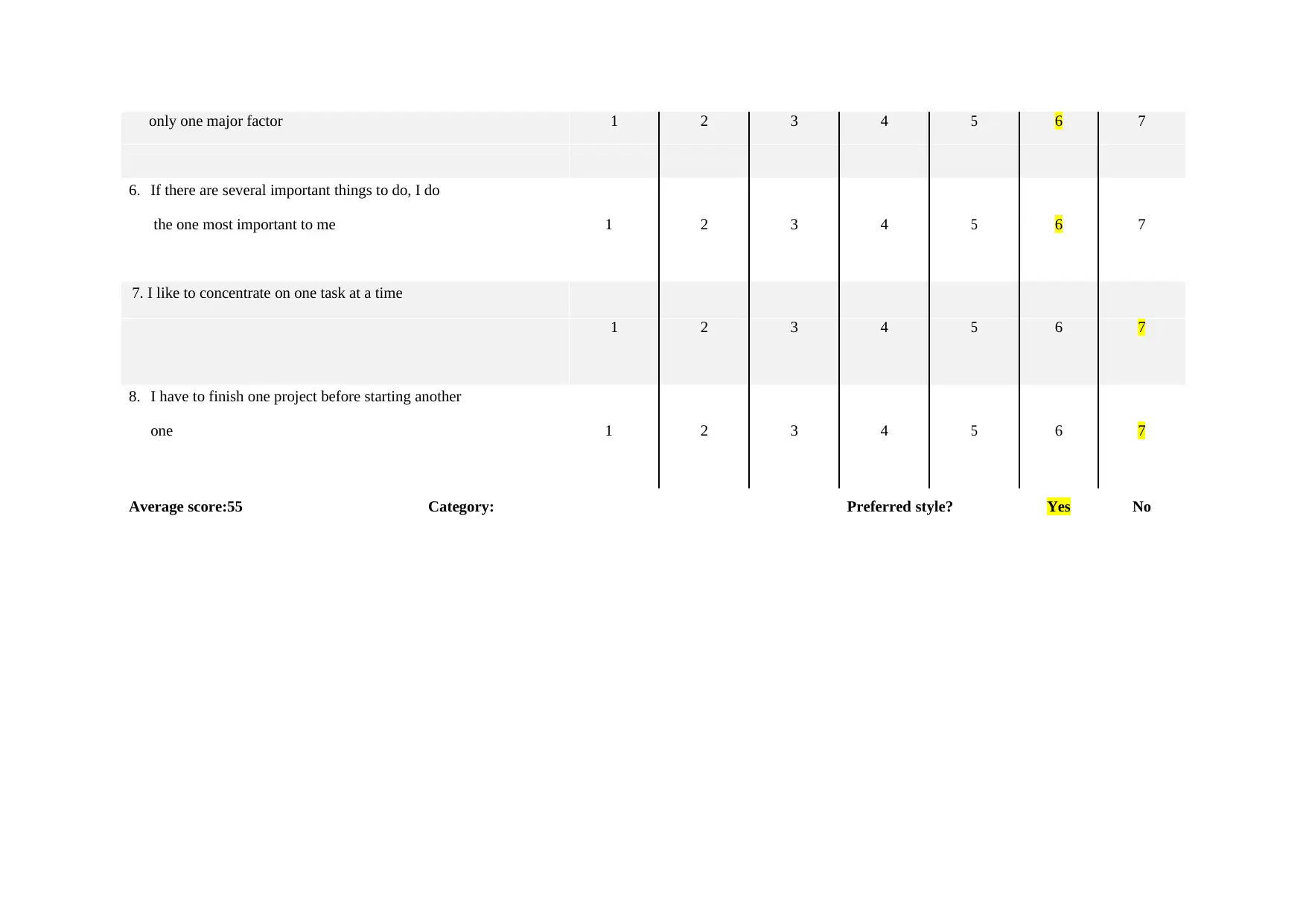
only one major factor 1 2 3 4 5 6 7
6. If there are several important things to do, I do
the one most important to me 1 2 3 4 5 6 7
7. I like to concentrate on one task at a time
1 2 3 4 5 6 7
8. I have to finish one project before starting another
one 1 2 3 4 5 6 7
Average score:55 Category: Preferred style? Yes No
6. If there are several important things to do, I do
the one most important to me 1 2 3 4 5 6 7
7. I like to concentrate on one task at a time
1 2 3 4 5 6 7
8. I have to finish one project before starting another
one 1 2 3 4 5 6 7
Average score:55 Category: Preferred style? Yes No
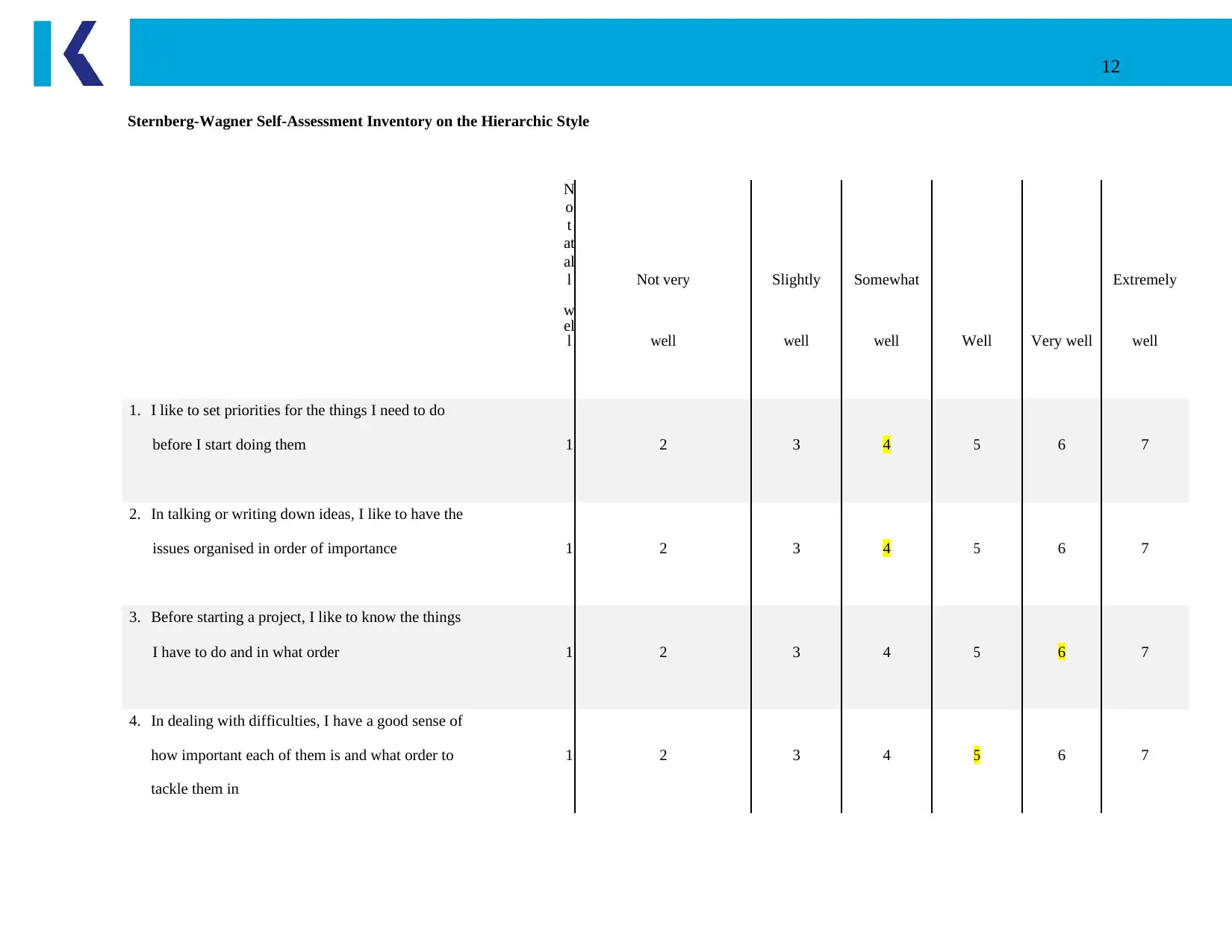
12
Sternberg-Wagner Self-Assessment Inventory on the Hierarchic Style
N
o
t
at
al
l Not very Slightly Somewhat Extremely
w
el
l well well well Well Very well well
1. I like to set priorities for the things I need to do
before I start doing them 1 2 3 4 5 6 7
2. In talking or writing down ideas, I like to have the
issues organised in order of importance 1 2 3 4 5 6 7
3. Before starting a project, I like to know the things
I have to do and in what order 1 2 3 4 5 6 7
4. In dealing with difficulties, I have a good sense of
how important each of them is and what order to 1 2 3 4 5 6 7
tackle them in
Sternberg-Wagner Self-Assessment Inventory on the Hierarchic Style
N
o
t
at
al
l Not very Slightly Somewhat Extremely
w
el
l well well well Well Very well well
1. I like to set priorities for the things I need to do
before I start doing them 1 2 3 4 5 6 7
2. In talking or writing down ideas, I like to have the
issues organised in order of importance 1 2 3 4 5 6 7
3. Before starting a project, I like to know the things
I have to do and in what order 1 2 3 4 5 6 7
4. In dealing with difficulties, I have a good sense of
how important each of them is and what order to 1 2 3 4 5 6 7
tackle them in
⊘ This is a preview!⊘
Do you want full access?
Subscribe today to unlock all pages.

Trusted by 1+ million students worldwide
1 out of 13
Related Documents
Your All-in-One AI-Powered Toolkit for Academic Success.
+13062052269
info@desklib.com
Available 24*7 on WhatsApp / Email
![[object Object]](/_next/static/media/star-bottom.7253800d.svg)
Unlock your academic potential
Copyright © 2020–2026 A2Z Services. All Rights Reserved. Developed and managed by ZUCOL.





